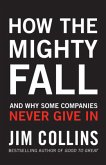Andrew O. Smith CFO
Financial Literacy for Millennials
A Practical Guide to Managing Your Financial Life for Teens, College Students, and Young Adults
Andrew O. Smith CFO
Financial Literacy for Millennials
A Practical Guide to Managing Your Financial Life for Teens, College Students, and Young Adults
- Gebundenes Buch
- Merkliste
- Auf die Merkliste
- Bewerten Bewerten
- Teilen
- Produkt teilen
- Produkterinnerung
- Produkterinnerung
"Combining practical advice with targeted information on virtually every aspect of personal finance and money management, this book is the ideal resource for young people who want to start off their financial lives properly"--
Andere Kunden interessierten sich auch für
![Invested Invested]() Danielle TownInvested13,99 €
Danielle TownInvested13,99 €![How the Mighty Fall How the Mighty Fall]() Jim CollinsHow the Mighty Fall22,99 €
Jim CollinsHow the Mighty Fall22,99 €![The New Librarianship Field Guide The New Librarianship Field Guide]() R. David Lankes (Director and University of South C Associate DeanThe New Librarianship Field Guide30,99 €
R. David Lankes (Director and University of South C Associate DeanThe New Librarianship Field Guide30,99 €![Broke Millennial Takes on Investing Broke Millennial Takes on Investing]() Erin LowryBroke Millennial Takes on Investing14,99 €
Erin LowryBroke Millennial Takes on Investing14,99 €![Getting to Yes with Yourself Getting to Yes with Yourself]() William UryGetting to Yes with Yourself16,99 €
William UryGetting to Yes with Yourself16,99 €![Money for Millennials Money for Millennials]() Sarah Young FisherMoney for Millennials22,99 €
Sarah Young FisherMoney for Millennials22,99 €![Everything Is F*cked Everything Is F*cked]() Mark MansonEverything Is F*cked16,99 €
Mark MansonEverything Is F*cked16,99 €-
-
-
"Combining practical advice with targeted information on virtually every aspect of personal finance and money management, this book is the ideal resource for young people who want to start off their financial lives properly"--
Hinweis: Dieser Artikel kann nur an eine deutsche Lieferadresse ausgeliefert werden.
Hinweis: Dieser Artikel kann nur an eine deutsche Lieferadresse ausgeliefert werden.
Produktdetails
- Produktdetails
- Verlag: Bloomsbury Publishing Plc
- Seitenzahl: 216
- Erscheinungstermin: 22. August 2016
- Englisch
- Abmessung: 240mm x 161mm x 16mm
- Gewicht: 482g
- ISBN-13: 9781440834028
- ISBN-10: 1440834024
- Artikelnr.: 44322354
- Herstellerkennzeichnung
- Books on Demand GmbH
- In de Tarpen 42
- 22848 Norderstedt
- info@bod.de
- 040 53433511
- Verlag: Bloomsbury Publishing Plc
- Seitenzahl: 216
- Erscheinungstermin: 22. August 2016
- Englisch
- Abmessung: 240mm x 161mm x 16mm
- Gewicht: 482g
- ISBN-13: 9781440834028
- ISBN-10: 1440834024
- Artikelnr.: 44322354
- Herstellerkennzeichnung
- Books on Demand GmbH
- In de Tarpen 42
- 22848 Norderstedt
- info@bod.de
- 040 53433511
Andrew T. Smith, now a Professor Emeritus, served on the faculty of the School of Life Sciences at Arizona State University for 39 years. He was chosen as Professor of the Year by the Parent's Association in 2006 and awarded the rank of President's Professor in 2010. The College of Liberal Arts and Sciences awarded Smith the Zebulon Pearce Distinguished Teaching Award in 2016.Smith is a conservation biologist whose work includes the behavioral ecology of mammals, effects of habitat fragmentation, and ecosystem services provided by small mammals. He primarily works in the mountains of western United States and on the Tibetan plateau. His research focuses on the pika, a small relative of rabbits. He is an avowed field biologist who is proud to have not conducted any lab bench work in his long career.Smith is involved in global conservation issues and served as Chair of the IUCN Species Survival Commission Lagomorph Specialist Group from 1991 - 2021. He has also advised the Chinese government on issues concerning biodiversity (Biodiversity Working Group of the China Council for International Cooperation on Environment and Development). The American Society of Mammalogists chose Smith as recipient of its 2015 Aldo Leopold Conservation Award. In addition to publishing ~130 papers, his A Guide to the Mammals of China (Princeton University Press; 2008) was the first comprehensive treatment of the 556 mammal species found in China (also available in Chinese - Hunan Education Publishing House: Changsha, Hunan, China; 2009). Smith has also produced Mammals of China (Princeton University Press Pocket Guide; 2013) and Lagomorphs: Pikas, Rabbits, and Hares of the World (Johns Hopkins University Press; 2013). He teamed with his wife, Harriet, to write The Astonishing, Astounding, Amazing Sonoran Desert (Dockside Sailing Press; 2019, Second Edition - Publish Authority, 2021)
Acknowledgments Prologue: A Tale of Two Teens ONE: Financial Planning
Money. Inflation. Personal Responsibility. Life Goals. Experts. Elements of
a Financial Plan. Keeping Track. Giving Back. A Balanced Life. TWO: Careers
Career Paths. Human Capital, Education, and Training. The Labor Market.
Lifetime Income. Job Satisfaction. Compensation and Overtime. Negotiating
Pay and Benefits. Careers to Consider. Experiential Work. Internships,
Mentors, and References. THREE: Business and Entrepreneurship Business
Organization. The Language of Business. Startups. Franchises. Side
Businesses. Real Estate. Sources of Funding. The Economy. Growth and
Recession. International Business. FOUR: Savings and Banking Why Save? How
to Save. Banking Basics. Bank Accounts. Automated Teller Machines. Prepaid
Debit Cards. Other Financial Institutions. Fees and Services.
Reconciliation. Mobile Payment Systems. Electronic Banking. Deposit
Insurance. Bank Safety. FIVE: Budgeting and Spending How to Budget.
Everyday Spending. Savings and Emergencies. Sample Budget. Automobiles.
Renting an Apartment. Owning a Home. Renting versus Buying. College.
Children. Value. Consumers Beware. SIX: Credit and Debt Loans. Time Value
of Money. Collateral and Repayment. Mortgages. Interest Rates.
Amortization. Credit Cards. Automobile and Personal Loans. Credit Reports.
Payday Lending. Debt Collection. Responsible Use. SEVEN: Bankruptcy Why
Bankruptcy? Types of Bankruptcy. Exempt Property. Discharge of Debts.
Bankruptcy Process. Avoiding Bankruptcy. Credit Counseling. Business
Bankruptcies. After Bankruptcy. EIGHT: Investments Compounding.
Understanding Risk. The Stock Market. Mutual Funds. Market Index Funds.
Bonds. Treasury Securities and Money Market Funds. Derivatives. Commodities
and Currencies. Other Investments. Losses. Safety of Financial Markets.
NINE: Avoiding Financial Scams Pyramid Schemes. Other Investment Frauds.
Identity Theft. Safe Computers. Internet Scams. Bitcoins. Get Rich in Real
Estate. Multi-Level Marketing. Day Trading. Gambling. Other Scams. Consumer
Protection. TEN: Insurance How Insurance Works. Property Insurance. Title
Insurance. Renter's Insurance. Cars and Other Vehicles. Health Insurance.
Disability Insurance. Life Insurance. Liability Insurance. Social Media
Risks. Insurance for Other Risks. ELEVEN: Taxes How Taxes Work. What Taxes
Support. Sales Taxes. Income Taxes. Employment Taxes. Property Taxes. Other
Taxes. Tax Expenditures. Taxes and Behavior. Tax Considerations for
Business. TWELVE: Government Benefits Social Security. Medicare. Poverty.
Medicaid and the Affordable Care Act. Food Stamps. Student Loans. Home Loan
Programs. Other Housing Support. Direct Financial Assistance. Job-Related
Assistance. Other Benefit Programs. THIRTEEN: Legal Issues Contracts.
Prenuptial Agreements. Liability. Property. Intellectual Property.
Accidents. Civil Litigation. Law in the Workplace. Using Lawyers.
FOURTEEN: Growing Older Retirement Plans. Pensions. How Much Do You Need?
Wills and Estates. Trusts. Health Issues. Family Obligations. APPENDIX 1:
Website Content APPENDIX 2: Takeaway Tips Top Ten Financial Tips. First Job
Tips. Tips for College. Tips for Graduating Students. APPENDIX 3:
Curriculum Planning Index
Money. Inflation. Personal Responsibility. Life Goals. Experts. Elements of
a Financial Plan. Keeping Track. Giving Back. A Balanced Life. TWO: Careers
Career Paths. Human Capital, Education, and Training. The Labor Market.
Lifetime Income. Job Satisfaction. Compensation and Overtime. Negotiating
Pay and Benefits. Careers to Consider. Experiential Work. Internships,
Mentors, and References. THREE: Business and Entrepreneurship Business
Organization. The Language of Business. Startups. Franchises. Side
Businesses. Real Estate. Sources of Funding. The Economy. Growth and
Recession. International Business. FOUR: Savings and Banking Why Save? How
to Save. Banking Basics. Bank Accounts. Automated Teller Machines. Prepaid
Debit Cards. Other Financial Institutions. Fees and Services.
Reconciliation. Mobile Payment Systems. Electronic Banking. Deposit
Insurance. Bank Safety. FIVE: Budgeting and Spending How to Budget.
Everyday Spending. Savings and Emergencies. Sample Budget. Automobiles.
Renting an Apartment. Owning a Home. Renting versus Buying. College.
Children. Value. Consumers Beware. SIX: Credit and Debt Loans. Time Value
of Money. Collateral and Repayment. Mortgages. Interest Rates.
Amortization. Credit Cards. Automobile and Personal Loans. Credit Reports.
Payday Lending. Debt Collection. Responsible Use. SEVEN: Bankruptcy Why
Bankruptcy? Types of Bankruptcy. Exempt Property. Discharge of Debts.
Bankruptcy Process. Avoiding Bankruptcy. Credit Counseling. Business
Bankruptcies. After Bankruptcy. EIGHT: Investments Compounding.
Understanding Risk. The Stock Market. Mutual Funds. Market Index Funds.
Bonds. Treasury Securities and Money Market Funds. Derivatives. Commodities
and Currencies. Other Investments. Losses. Safety of Financial Markets.
NINE: Avoiding Financial Scams Pyramid Schemes. Other Investment Frauds.
Identity Theft. Safe Computers. Internet Scams. Bitcoins. Get Rich in Real
Estate. Multi-Level Marketing. Day Trading. Gambling. Other Scams. Consumer
Protection. TEN: Insurance How Insurance Works. Property Insurance. Title
Insurance. Renter's Insurance. Cars and Other Vehicles. Health Insurance.
Disability Insurance. Life Insurance. Liability Insurance. Social Media
Risks. Insurance for Other Risks. ELEVEN: Taxes How Taxes Work. What Taxes
Support. Sales Taxes. Income Taxes. Employment Taxes. Property Taxes. Other
Taxes. Tax Expenditures. Taxes and Behavior. Tax Considerations for
Business. TWELVE: Government Benefits Social Security. Medicare. Poverty.
Medicaid and the Affordable Care Act. Food Stamps. Student Loans. Home Loan
Programs. Other Housing Support. Direct Financial Assistance. Job-Related
Assistance. Other Benefit Programs. THIRTEEN: Legal Issues Contracts.
Prenuptial Agreements. Liability. Property. Intellectual Property.
Accidents. Civil Litigation. Law in the Workplace. Using Lawyers.
FOURTEEN: Growing Older Retirement Plans. Pensions. How Much Do You Need?
Wills and Estates. Trusts. Health Issues. Family Obligations. APPENDIX 1:
Website Content APPENDIX 2: Takeaway Tips Top Ten Financial Tips. First Job
Tips. Tips for College. Tips for Graduating Students. APPENDIX 3:
Curriculum Planning Index
Acknowledgments Prologue: A Tale of Two Teens ONE: Financial Planning
Money. Inflation. Personal Responsibility. Life Goals. Experts. Elements of
a Financial Plan. Keeping Track. Giving Back. A Balanced Life. TWO: Careers
Career Paths. Human Capital, Education, and Training. The Labor Market.
Lifetime Income. Job Satisfaction. Compensation and Overtime. Negotiating
Pay and Benefits. Careers to Consider. Experiential Work. Internships,
Mentors, and References. THREE: Business and Entrepreneurship Business
Organization. The Language of Business. Startups. Franchises. Side
Businesses. Real Estate. Sources of Funding. The Economy. Growth and
Recession. International Business. FOUR: Savings and Banking Why Save? How
to Save. Banking Basics. Bank Accounts. Automated Teller Machines. Prepaid
Debit Cards. Other Financial Institutions. Fees and Services.
Reconciliation. Mobile Payment Systems. Electronic Banking. Deposit
Insurance. Bank Safety. FIVE: Budgeting and Spending How to Budget.
Everyday Spending. Savings and Emergencies. Sample Budget. Automobiles.
Renting an Apartment. Owning a Home. Renting versus Buying. College.
Children. Value. Consumers Beware. SIX: Credit and Debt Loans. Time Value
of Money. Collateral and Repayment. Mortgages. Interest Rates.
Amortization. Credit Cards. Automobile and Personal Loans. Credit Reports.
Payday Lending. Debt Collection. Responsible Use. SEVEN: Bankruptcy Why
Bankruptcy? Types of Bankruptcy. Exempt Property. Discharge of Debts.
Bankruptcy Process. Avoiding Bankruptcy. Credit Counseling. Business
Bankruptcies. After Bankruptcy. EIGHT: Investments Compounding.
Understanding Risk. The Stock Market. Mutual Funds. Market Index Funds.
Bonds. Treasury Securities and Money Market Funds. Derivatives. Commodities
and Currencies. Other Investments. Losses. Safety of Financial Markets.
NINE: Avoiding Financial Scams Pyramid Schemes. Other Investment Frauds.
Identity Theft. Safe Computers. Internet Scams. Bitcoins. Get Rich in Real
Estate. Multi-Level Marketing. Day Trading. Gambling. Other Scams. Consumer
Protection. TEN: Insurance How Insurance Works. Property Insurance. Title
Insurance. Renter's Insurance. Cars and Other Vehicles. Health Insurance.
Disability Insurance. Life Insurance. Liability Insurance. Social Media
Risks. Insurance for Other Risks. ELEVEN: Taxes How Taxes Work. What Taxes
Support. Sales Taxes. Income Taxes. Employment Taxes. Property Taxes. Other
Taxes. Tax Expenditures. Taxes and Behavior. Tax Considerations for
Business. TWELVE: Government Benefits Social Security. Medicare. Poverty.
Medicaid and the Affordable Care Act. Food Stamps. Student Loans. Home Loan
Programs. Other Housing Support. Direct Financial Assistance. Job-Related
Assistance. Other Benefit Programs. THIRTEEN: Legal Issues Contracts.
Prenuptial Agreements. Liability. Property. Intellectual Property.
Accidents. Civil Litigation. Law in the Workplace. Using Lawyers.
FOURTEEN: Growing Older Retirement Plans. Pensions. How Much Do You Need?
Wills and Estates. Trusts. Health Issues. Family Obligations. APPENDIX 1:
Website Content APPENDIX 2: Takeaway Tips Top Ten Financial Tips. First Job
Tips. Tips for College. Tips for Graduating Students. APPENDIX 3:
Curriculum Planning Index
Money. Inflation. Personal Responsibility. Life Goals. Experts. Elements of
a Financial Plan. Keeping Track. Giving Back. A Balanced Life. TWO: Careers
Career Paths. Human Capital, Education, and Training. The Labor Market.
Lifetime Income. Job Satisfaction. Compensation and Overtime. Negotiating
Pay and Benefits. Careers to Consider. Experiential Work. Internships,
Mentors, and References. THREE: Business and Entrepreneurship Business
Organization. The Language of Business. Startups. Franchises. Side
Businesses. Real Estate. Sources of Funding. The Economy. Growth and
Recession. International Business. FOUR: Savings and Banking Why Save? How
to Save. Banking Basics. Bank Accounts. Automated Teller Machines. Prepaid
Debit Cards. Other Financial Institutions. Fees and Services.
Reconciliation. Mobile Payment Systems. Electronic Banking. Deposit
Insurance. Bank Safety. FIVE: Budgeting and Spending How to Budget.
Everyday Spending. Savings and Emergencies. Sample Budget. Automobiles.
Renting an Apartment. Owning a Home. Renting versus Buying. College.
Children. Value. Consumers Beware. SIX: Credit and Debt Loans. Time Value
of Money. Collateral and Repayment. Mortgages. Interest Rates.
Amortization. Credit Cards. Automobile and Personal Loans. Credit Reports.
Payday Lending. Debt Collection. Responsible Use. SEVEN: Bankruptcy Why
Bankruptcy? Types of Bankruptcy. Exempt Property. Discharge of Debts.
Bankruptcy Process. Avoiding Bankruptcy. Credit Counseling. Business
Bankruptcies. After Bankruptcy. EIGHT: Investments Compounding.
Understanding Risk. The Stock Market. Mutual Funds. Market Index Funds.
Bonds. Treasury Securities and Money Market Funds. Derivatives. Commodities
and Currencies. Other Investments. Losses. Safety of Financial Markets.
NINE: Avoiding Financial Scams Pyramid Schemes. Other Investment Frauds.
Identity Theft. Safe Computers. Internet Scams. Bitcoins. Get Rich in Real
Estate. Multi-Level Marketing. Day Trading. Gambling. Other Scams. Consumer
Protection. TEN: Insurance How Insurance Works. Property Insurance. Title
Insurance. Renter's Insurance. Cars and Other Vehicles. Health Insurance.
Disability Insurance. Life Insurance. Liability Insurance. Social Media
Risks. Insurance for Other Risks. ELEVEN: Taxes How Taxes Work. What Taxes
Support. Sales Taxes. Income Taxes. Employment Taxes. Property Taxes. Other
Taxes. Tax Expenditures. Taxes and Behavior. Tax Considerations for
Business. TWELVE: Government Benefits Social Security. Medicare. Poverty.
Medicaid and the Affordable Care Act. Food Stamps. Student Loans. Home Loan
Programs. Other Housing Support. Direct Financial Assistance. Job-Related
Assistance. Other Benefit Programs. THIRTEEN: Legal Issues Contracts.
Prenuptial Agreements. Liability. Property. Intellectual Property.
Accidents. Civil Litigation. Law in the Workplace. Using Lawyers.
FOURTEEN: Growing Older Retirement Plans. Pensions. How Much Do You Need?
Wills and Estates. Trusts. Health Issues. Family Obligations. APPENDIX 1:
Website Content APPENDIX 2: Takeaway Tips Top Ten Financial Tips. First Job
Tips. Tips for College. Tips for Graduating Students. APPENDIX 3:
Curriculum Planning Index








